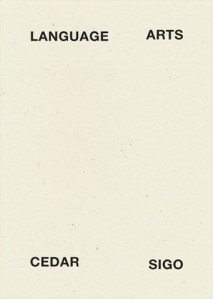Language Arts by Cedar Sigo
 I’ve been carrying Cedar Sigo’s Language Arts, released in April from Wave Books, around with me for the past several days, returning to its playful and enigmatic poems again and again. Picture a lover’s bedroom, sexily yet maddeningly littered with cigarettes and crumpled clothes, half-drunk coffee, wine glasses with lipstick around the rim, piles of papers, etc. A view of the mountains, or Paris, through the open window. The chaos is exciting, slightly overwhelming, and arousing. Being inside Language Arts is like this.
I’ve been carrying Cedar Sigo’s Language Arts, released in April from Wave Books, around with me for the past several days, returning to its playful and enigmatic poems again and again. Picture a lover’s bedroom, sexily yet maddeningly littered with cigarettes and crumpled clothes, half-drunk coffee, wine glasses with lipstick around the rim, piles of papers, etc. A view of the mountains, or Paris, through the open window. The chaos is exciting, slightly overwhelming, and arousing. Being inside Language Arts is like this.
The poems ask: how can one sculpt one’s brimming life into language? They ask: “what can I make with / what I have? / happy anger” (37). They say: let’s dig into the word glamorous. Let’s redefine glamour. Let’s frame the chaos of an individual’s life—full of experiences, places—as being glamorous. Glamorous explained as methodically messy, as an array of personal experiences, travels, and dream-like states, masterfully woven into lyrical collage.
Sigo writes:
…glamour is an investment
Involving desire and unreality. The poems are perfect
Laid back time machines, ground-blooming flowers
Their endless pastel grime in streaks (26)
Glamour which involves “desire and “unreality” commits itself to a kind of language play, which is a prevailing theme in the book (reflected its title Language Arts). Often compared to the rolling style of Frank O’Hara, Sigo employs a playfulness of form similar to collage. Sometimes in thin columns, sometimes couplets, sometimes spread widely across the page, Sigo’s poems reflect the movements of his mind—effusive and unpredictable.
This idea of the collage is introduced in the book’s opening poem, “Ode,” which is a thrilling and breathless stream of text. Sigo writes:
Master collagist lover householder editor surrealist confidant, making magic
pointed underpinnings on paper pulled through a typewriter, personal priest,
follower, holed up in Cairo, stuffy small room you never want to leave… (3)
Here, Sigo seems to introduce himself. This is what I am, he says. These are what poems can be. Many things which refuse to be pinned down, which refuse stasis.
Within Sigo’s collage is also an underlying darkness. The poems remind us of the continual presence of the memories of where one comes from, like throbbing, painful jewels in the body. Yes, this is still glamour, Sigo seems to say. Glamour as inner strength. He writes: “What they think of/ as pain inside/ I think of as glamour” (32).
Later, Sigo adds the single, raw couplet: “Pain soaks through me / colder than rain” (50).
Some of the poems’ underlying darkness felt distinctly familiar to me, as a native of the Pacific Northwest, growing up in Washington State near the Suquamish Reservation where Cedar Sigo was raised. In this corner of the Northwest, literal darkness is pervasive, relentless. Sigo channels this darkness in his poems, where lines like “We watch the wind move / wet shadows on a stick / trace the old (gold) / and flaking” (32) make his readers feel as though they’ve returned to a childhood home, which is a house of dripping gutters and wet forest.
In moments such as this, Sigo’s language feels intentionally heavier than the buoyant flashes of memory and language play in other poems. This darkness often feels oppressive and rich, gives a velvety texture to the book. In “Hot Water Music”:
Amber gates and worried songs deflected nightly
with your hand mirror, birdcalls
cutting each other off on a mix-tape
We drank another pint
and ate the salmon
and slept like logs (42)
However, this heavy darkness is metered by Sigo’s refusal to remain in one place for long. One of my favorite moments in the book is in the poem “XXXV,” which opens with the brilliant line: “Fuck off with your crippling guilt / The earth has edges, boys get thrown in fountains.” He concludes the poem: “Draw me in deeper with deceit and smoke, let’s go again” (21). This line, and the rest of the poem, seem to be a reminder that no matter how heavy one feels, there can be in this darkness a redemptive thrill, even—strange as it sounds—a redemptive sexiness. Sigo reminds us of the glamorous chaos which is our daily collage, which is our life.
Language Arts is available from Wave Books
A native of the Pacific Northwest, Ansley Clark is currently an MFA candidate at University of Colorado Boulder, where she also teaches creative writing. Her poems have appeared in Smoking Glue Gun, BODY, Spork, and elsewhere. She has work forthcoming in Denver Quarterly and Berkeley Poetry Review.